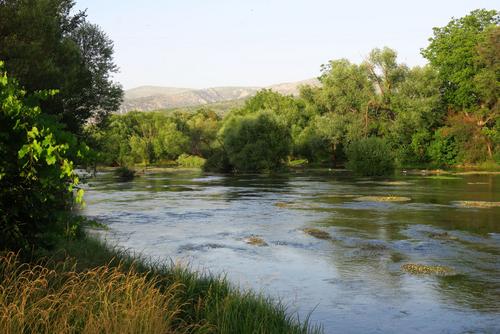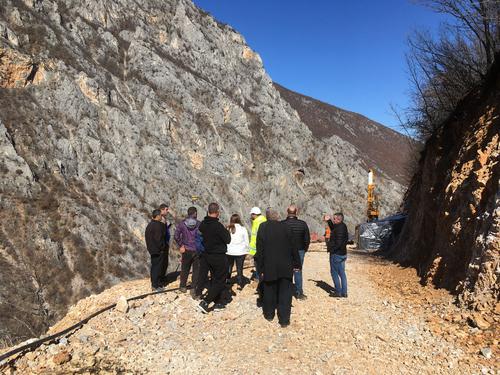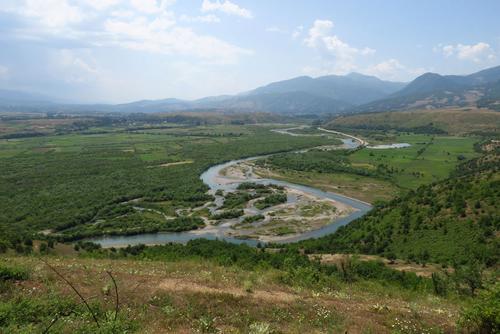Greenfield large hydropower investments across southeast Europe (1) face major risks and low realisation rates, according to a new report by CEE Bankwatch, EuroNatur, Riverwatch and WWF Adria published today, which also highlights nine high-risk project cases (2).

The Buna, border river between Albania and Montenegro; endangered by hydropower projects.
© Andrey Ralev
Europe's largest dam is planned on the Black Drin in Albania.
© Amelie Huber
Part of the area in Albania that would be flooded by the planned Skavica dam.
© Andrey RalevAlthough hundreds of small hydropower plants – which are highly damaging for biodiversity – have been built across the region in the last decade, attempts to build greenfield hydropower plants of larger than 10 MW have largely been unsuccessful, with only Albania and Slovenia managing to do so.
Vulnerability to drought, legal issues, increasing public resistance and lack of financing are among the factors which have stopped a slew of large hydropower projects in recent years, including two on the Vjosa river in Albania, two in North Macedonia’s Mavrovo National Park, and several on the rivers Morača and Vrbas in Montenegro and Bosnia and Herzegovina.
Hydropower, together with coal, has traditionally played a major role in southeast Europe, but climate change is challenging this role. Albania has added around 600 MW in large plants and several more hundred megawatts of smaller plants since 2010, yet average hydropower generation barely increased between 2010 and 2020. In Bosnia and Herzegovina, Croatia and Montenegro, which added only small hydropower plants, average generation even decreased slightly.
Undeterred, the region’s governments and utilities are keen to build even more large hydropower. Bosnia and Herzegovina is particularly ambitious, planning at least 12 large dams despite its failure to complete a single large greenfield plant in the last decade.
Financing is becoming more scarce as the European Investment Bank, European Bank for Reconstruction and Development and Germany’s KfW have become more cautious of late, leaving Chinese and Turkish banks, as well as the US International Development Finance Corporation (DFC), among the few willing to bet on such a risky sector.
Yet despite Chinese companies being involved in several projects in Bosnia and Herzegovina – including the Ulog plant on the upper Neretva, a series of three plants on the Bistrica, and potentially also another three plants on the upper Drina – the only confirmed Chinese financing is for the controversial 160 MW Dabar plant, for which a EUR 180 million Eximbank loan was signed in January this year.
"Hydropower generation in the region is going up and down like a yo-yo due to climate change, making it futile to add more dams. This is most obvious in countries like Albania, Bosnia and Herzegovina, Croatia and Montenegro that are already quite hydropower-dependent. It’s utterly incomprehensible that as of the end of 2021, Montenegro only had 2.5 MW of solar photovoltaics installed. Diversification of renewables and a serious ramping up of energy efficiency is urgently needed", said Pippa Gallop from CEE Bankwatch Network.
EuroNatur project manager Dr. Amelie Huber adds: "Hydropower investors continue to be lured by the prospects of a free energy source that’s always available, but hydropower has long ceased to be that: time and cost overruns are the order of the day, especially when it comes to large hydro, and river flow is no longer reliable. And the very negative impact of hydropower on the biodiversity of river systems has to be taken into account on top of that. Countries whose energy systems depend on hydro will pay a high price as climate change impacts intensify and droughts and floods become more frequent."
Notes for editors
(1) The Southeast European countries covered by the report are Albania, Bosnia and Herzegovina, Bulgaria, Croatia, Kosovo, Montenegro, North Macedonia, Serbia, Slovenia.
(2) The project case studies are:
- Skavica, Albania
- Bistrica B-1, B-2, B-3, Bosnia and Herzegovina
- Buk Bijela / Upper Drina, Bosnia and Herzegovina
- Dabar / Upper Horizons, Bosnia and Herzegovina
- Ulog and Upper Neretva, Bosnia and Herzegovina
- Janjići, Bosnia and Herzegovina
- Yadenitsa, Bulgaria
- Kosinj/Senj II, Croatia
- Komarnica, Montenegro
Background information:
- The "Save the Blue Heart of Europe" campaign aims to protect rivers of high natural value in the Balkans, which are threatened by over 3,500 hydropower projects. The campaign is coordinated by the international NGOs Riverwatch and EuroNatur and is implemented jointly with partner organizations in the Balkan countries. The campaign is coordinated by the NGOs Riverwatch and EuroNatur and carried out in conjunction with partner organisations from the Balkan countries.
- The report is available at: https://bankwatch.org/publication/why-hydropower-in-southeast-europe-is-a-risky-investment
- The campaign is supported amongst others by the Manfred-Hermsen-Stiftung.
Contacts:
Pippa Gallop, Southeast Europe Energy Advisor, CEE Bankwatch Network
pippa.gallop(at)bankwatch.org
+385 99 755 9787
Skype pippa.gallop
Christian Stielow
EuroNatur
christian.stielow(at)euronatur.org
+49 07732 927215
Cornelia Wieser
Riverwatch
cornelia.wieser(at)riverwatch.eu
+43 650 4544784
Petra Boic Petrac
WWF Adria
ppetrac(at)wwfadria.org
+385 91 2905976
Select on which of your areas of interest you would like to receive our press releases.
You can subscribe to our RSS feeds to receive all the news on the topics of your choice.


